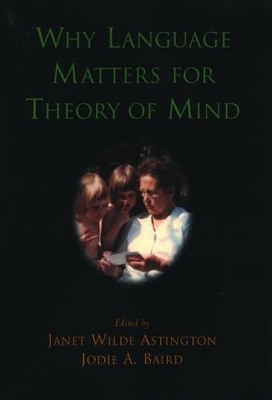
Why Language Matters for Theory of Mind
Oxford University Press Inc (Verlag)
978-0-19-515991-2 (ISBN)
"Theory of mind" is the phrase researchers use to refer to children's understanding of people as mental beings, who have beliefs, desires, emotions, and intentions, and whose actions and interactions can be interpreted and explained by taking account of these mental states. The gradual development of children's theory of mind, particularly during the early years, is by now well described in the research literature. What is lacking, however, is a decisive explanation of how children acquire this understanding. Recent research has shown strong relations between children's linguistic abilities and their theory of mind. Yet exactly what role these abilities play is controversial and uncertain. The purpose of this book is to provide a forum for the leading scholars in the field to explore thoroughly the role of language in the development of the theory of mind. This volume will appeal to students and researchers in developmental and cognitive psychology.
1. Introduction: Why Language Matters ; 2. Language pathways into the community of minds ; 3. Communication, relationships, and individual differences in children's understanding of mind ; 4. Conversation, pretence and theory of mind ; 5. Talking about "new" information: the given/new distinction and children's developing theory of mind ; 6. The developmental origins of meaning for mental terms ; 7. Language promotes structural alignment in the acquisition of mentalistic concepts ; 8. Language and the development of cognitive flexibility: Implications for theory of mind ; 9. Representational development and false-belief understanding ; 10. Can language acquisition give children a point of view? ; 11. What does "that" have to do with point of view? Conflicting desires and "want" in German ; 12. Linguistic communication and social understanding ; 13. The role of language in theory-of-mind development: What deaf children tell us ; 14. How language facilitates the acquisition of false-belief understanding in children with autism ; 15. Genetic and environmental influences on individual differences in language and theory of mind: Common or distinct?
| Erscheint lt. Verlag | 1.5.2005 |
|---|---|
| Zusatzinfo | numerous figures and tables |
| Verlagsort | New York |
| Sprache | englisch |
| Maße | 166 x 242 mm |
| Gewicht | 644 g |
| Themenwelt | Geisteswissenschaften ► Psychologie ► Allgemeine Psychologie |
| Geisteswissenschaften ► Psychologie ► Entwicklungspsychologie | |
| Geisteswissenschaften ► Psychologie ► Verhaltenstherapie | |
| ISBN-10 | 0-19-515991-8 / 0195159918 |
| ISBN-13 | 978-0-19-515991-2 / 9780195159912 |
| Zustand | Neuware |
| Informationen gemäß Produktsicherheitsverordnung (GPSR) | |
| Haben Sie eine Frage zum Produkt? |
aus dem Bereich


